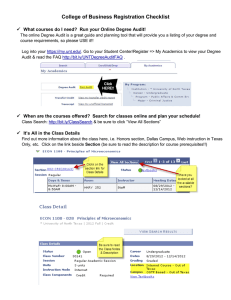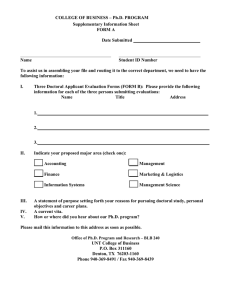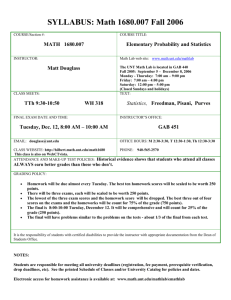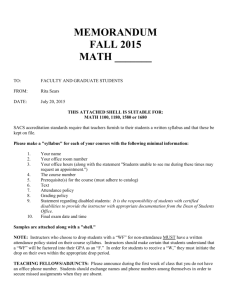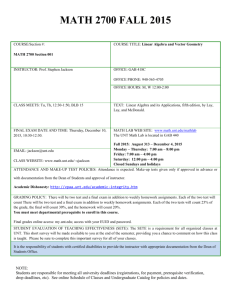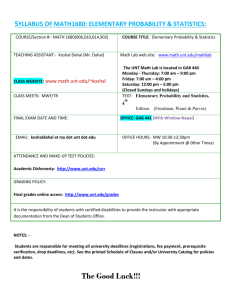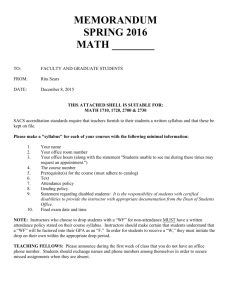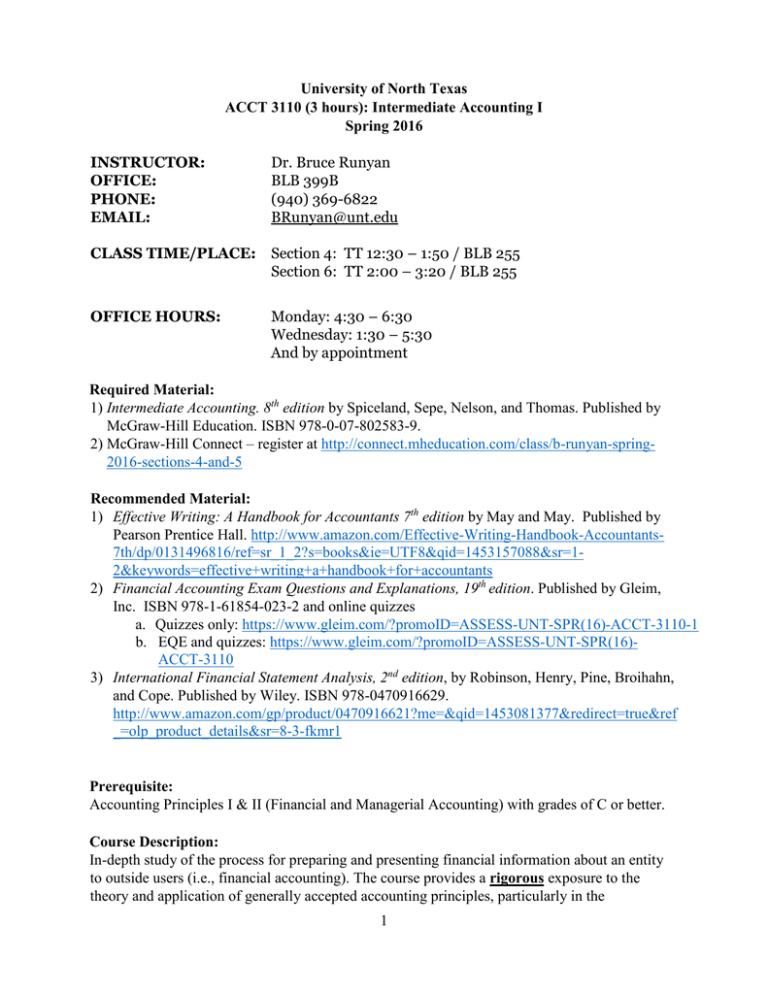
University of North Texas
ACCT 3110 (3 hours): Intermediate Accounting I
Spring 2016
INSTRUCTOR:
OFFICE:
PHONE:
EMAIL:
Dr. Bruce Runyan
BLB 399B
(940) 369-6822
BRunyan@unt.edu
CLASS TIME/PLACE: Section 4: TT 12:30 – 1:50 / BLB 255
Section 6: TT 2:00 – 3:20 / BLB 255
OFFICE HOURS:
Monday: 4:30 – 6:30
Wednesday: 1:30 – 5:30
And by appointment
Required Material:
1) Intermediate Accounting. 8th edition by Spiceland, Sepe, Nelson, and Thomas. Published by
McGraw-Hill Education. ISBN 978-0-07-802583-9.
2) McGraw-Hill Connect – register at http://connect.mheducation.com/class/b-runyan-spring2016-sections-4-and-5
Recommended Material:
1) Effective Writing: A Handbook for Accountants 7th edition by May and May. Published by
Pearson Prentice Hall. http://www.amazon.com/Effective-Writing-Handbook-Accountants7th/dp/0131496816/ref=sr_1_2?s=books&ie=UTF8&qid=1453157088&sr=12&keywords=effective+writing+a+handbook+for+accountants
2) Financial Accounting Exam Questions and Explanations, 19th edition. Published by Gleim,
Inc. ISBN 978-1-61854-023-2 and online quizzes
a. Quizzes only: https://www.gleim.com/?promoID=ASSESS-UNT-SPR(16)-ACCT-3110-1
b. EQE and quizzes: https://www.gleim.com/?promoID=ASSESS-UNT-SPR(16)ACCT-3110
3) International Financial Statement Analysis, 2nd edition, by Robinson, Henry, Pine, Broihahn,
and Cope. Published by Wiley. ISBN 978-0470916629.
http://www.amazon.com/gp/product/0470916621?me=&qid=1453081377&redirect=true&ref
_=olp_product_details&sr=8-3-fkmr1
Prerequisite:
Accounting Principles I & II (Financial and Managerial Accounting) with grades of C or better.
Course Description:
In-depth study of the process for preparing and presenting financial information about an entity
to outside users (i.e., financial accounting). The course provides a rigorous exposure to the
theory and application of generally accepted accounting principles, particularly in the
1
recognition, measurement, disclosure and analysis of assets. The course moves at a fast pace and
is more demanding than the prerequisite courses. Students need to invest more hours in this
course than prior accounting courses to perform at an acceptable level.
Learning Objectives:
The objective of ACCT 3110, which is a prerequisite course for ACCT 3120 Intermediate
Accounting II, is to continue to develop the analytical and decision-making skills needed for
success as a professional in accountant. When you complete this course, you should be able
to:
• Prepare and analyze an income statement, balance sheet, and statement of cash flows.
• Discuss the rationale and nature of current financial reporting and disclosure regulations
• Understand, recognize, measure, and disclose various transactions and events dealing
primarily with revenues and assets.
Point Distribution:
Assessment
Practice Set (Great Adventures)
Quizzes
Cases
Exams
Final exam
Total
Weight
5.00%
9.00%
10.00%
66.00%
10.00%
100.00%
Grading Scale:
Course Grade
Weighted Average
A
B
C
D
F
≥ 90%
80-89%
70-79%
60-69%
< 60%
Use the grade calculator spreadsheet provided on our Blackboard to monitor your grade throughout the
semester.
Withdrawals:
University policy relative to dropping the class will be followed. February 26 is the last date you can drop
with an automatic grade of W. After this date, you must have the instructor’s approval in order to receive
drop the course with a grade of W. You should consult with your academic advisor prior to the above dates
if you are considering dropping this course.
2
The Accounting Department enforces university policy regarding W/WF grades. If you drop this
course after the “Last Day for Auto W”, you must have earned at least 60% of assignment and
exam points to receive a W; otherwise, you will receive a WF.
Class Meetings:
Class attendance is strongly recommended. We will meet 30 times during the semester. Because
we have a significant amount of material to cover during the semester, the classes are structured
based on the assumption that students have read relevant textbook material prior to the class
meetings.
Connect Assignments:
The course assignment manager is McGraw-Hill Connect. A trial option is available that covers the first
two weeks of class. LearnSmart, homework, and practice assignments are available in Connect. You must
have completed 95% of all LearnSmart assignments for all chapters covered on an exam by 5:00 on the day
before the exam to qualify to sit for the exam. Likewise, you must have achieved a score of 90% on all
homework for the chapters covered on an exam by 5:00 on the day before the exam to qualify to sit for the
exam. If you do not have the required LearnSmart and homework scores, your score on the exam is 0.
LearnSmart assignments are based on completion. Applications are available for the IPhone and
IPad. After reading and studying the chapter, do the LearnSmart exercises to reinforce the
content and get feedback on areas that you have not yet mastered. LearnSmart has a variety of
diagnostics to identify areas that may require additional study.
If you have trouble using Connect, visit http://www.connectstudentsuccess.com/ or call either 1800-331-5094 or 1-866-280-6055. Make sure that you assignments earlier enough so that a
technical issue does not prevent completion of assignments
Practice assignments are included in the assignment manager to allow extra practice. They are
not required and do not count towards qualifying for the exam.
Practice Set:
The practice set is the Great Adventures assignments in Connect. The practice set is designed to
reinforce your understanding of the accounting cycle. The average grade on the practice set is 5% of the
course grade.
Quizzes:
Quizzes will be given at the beginning of most classes. The quizzes will cover the learning objectives
designated in the schedule. Quizzes begin promptly at the start of class. The lowest quiz grade will be
dropped. The average grade on the practice set is 9% of the course grade.
Cases:
Financial accounting cases are intended to give you experience with the practical application of course
learning objectives. You will use Word and Excel to complete the case. You will attach a Word document
3
and/or Excel file in Connect and a hardcopy in class on the due date. The average grade on the cases is 10%
of the course grade.
Exams:
The average exam grade on the five exams is worth 66% of the course grade (6% per chapter)
and the comprehensive final is worth 10% of the course grade. You may retake Exam 1, Exam
2 or Exam 3 on Saturday, April 23rd. The higher of the two scores counts towards the final
course grade.
Authorized absences due to participation in sponsored activities must be approved in advance.
Students should submit authorized absence cards from the Dean of Students
Excused absences: due to other causes, such as illness, emergency, death in the family, etc. are
termed “excused” or “not excused” at the discretion of the instructor and in accordance with
department and university policy. Students should show proof that the absence was unavoidable,
such as a physician’s statement, accident report, obituary, etc. (Note: The Student Health and
Wellness Center provides cards that verify the date and time of a student’s visit. Hospitalized
patients are given a form showing the inclusive dates of their hospitalization.)
In accordance with state law, students who are absent due to the observance of a religious
holiday may take examinations for the day missed within a reasonable time after the absence.
Typically this must be before the next class period since exam will be discussed in class. Travel
time required for religious observances shall also be excused. Only holidays or holy days
observed by a religion whose place of worship is exempt from property taxation under Section
11.20 of the Tax Code may be included.
Calculator Policy:
You may use any calculator. You will be required to use a BA II plus in your Principles of
Finance course.
Class Website:
A class website will be established and maintained throughout the course on Blackboard Learn
(go to http://www.unt.edu/ and click the link at the top for “Blackboard”). Class materials such as
notes, assignments, etc. are available in Blackboard Learn.
Course Topics:
Unit 1: The Role of Accounting as an Information System (chapters 1-5)
• Environment and Theoretical Structure of Financial Accounting
• The Accounting Process
• The Balance Sheet and Financial Disclosure
• The Income Statement, Comprehensive Income and the Statement of Cash Flows
• Revenue Recognition and Profitability Analysis
Unit 2: Economic Resources: Current Assets (chapters 7-9)
• Cash and Receivables
4
•
•
Inventories: Measurement
Inventories: Additional Issues
Unit 3: Economic Resources: Non-current Assets (chapters 10 – 12)
• Property, Plant, and Equipment and Intangible Assets: Acquisition and Disposition
• Property, Plant, and Equipment and Intangible Assets: Utilization and Impairment
• Investments
Methods of Instruction:
Lecture, discussion, and active learning through on-line homework assignments.
Academic Dishonesty:
Academic dishonesty will not be tolerated. Students caught cheating or plagiarizing will receive a
"0" for that particular assignment or exam. Any grade reduction based on academic dishonesty
cannot be made up in any way. Additionally, the incident will be reported to the Dean of
Students, who may impose further penalty. According to the UNT catalog, the term "cheating"
includes, but is not limited to: a. use of any unauthorized assistance in taking quizzes, tests, or
examinations; b. dependence upon the aid of sources beyond those authorized by the instructor in
writing papers, preparing reports, solving problems, or carrying out other assignments; c. the
acquisition, without permission, of tests or other academic material belonging to a faculty or staff
member of the university; d. dual submission of a paper or project, or resubmission of a paper or
project to a different class without express permission from the instructor(s); or e. any other act
designed to give a student an unfair advantage. The term "plagiarism" includes, but is not limited
to: a. the knowing or negligent use by paraphrase or direct quotation of the published or
unpublished work of another person without full and clear acknowledgment; and b. the knowing
or negligent unacknowledged use of materials prepared by another person or agency engaged in
the selling of term papers or other academic materials.
For more information on the UNT academic integrity policy, see:
http://policy.unt.edu/sites/default/files/untpolicy/pdf/7-Student_Affairs-Academic_Integrity.pdf
Academic integrity information is also available at: http://vpaa.unt.edu/academic-integrity.htm.
ADA Statement:
The University of North Texas makes reasonable academic accommodation for students with
disabilities. Students seeking accommodation must first register with the Office of Disability
Accommodation (ODA) to verify their eligibility. If a disability is verified, the ODA will provide
you with an accommodation letter to be delivered to faculty to begin a private discussion
regarding your specific needs in a course. You may request accommodations at any time,
however, ODA notices of accommodation should be provided as early as possible in the semester
to avoid any delay in implementation. Note that students must obtain a new letter of
accommodation for every semester and must meet with each faculty member prior to
implementation in each class. For additional information see the Office of Disability
Accommodation website at http://disability.unt.edu. You may also contact them by phone at
(940) 565-4323.
5
Acceptable Student Behavior:
Student behavior that interferes with an instructor’s ability to conduct a class or other students'
opportunity to learn is unacceptable and disruptive and will not be tolerated in any instructional
forum at UNT. Students engaging in unacceptable behavior will be directed to leave the
classroom and the instructor may refer the student to the Dean of Students to consider whether
the student's conduct violated the Code of Student Conduct. The university's expectations for
student conduct apply to all instructional forums, including university and electronic classroom,
labs, discussion groups, field trips, etc. The Code of Student Conduct can be found at
http://deanofstudents.unt.edu. Unacceptable student behavior may result in a reduction of up to 30 points on
the final course grade at the instructor’s discretion.
Retention of Student Records:
Student records pertaining to this course will be maintained in a secure location. All records such
as exams, answer sheets (with keys), and written papers submitted during the duration of the
course are kept for at least one calendar year after course completion. Course work completed via
the Blackboard online system, including grading information and comments, is also stored in a
safe electronic environment for one year. You have a right to view your individual record;
however, information about your records will not be divulged to other individuals without the
proper written consent. You are encouraged to review the Public Information Policy and
F.E.R.P.A. (Family Educational Rights and Privacy Act) laws and the university’s policy in
accordance with those mandates at the following link:
http://essc.unt.edu/registrar/ferpa.html
Emergency Notification & Procedures:
UNT uses a system called Eagle Alert to quickly notify you with critical information in the event
of an emergency (i.e., severe weather, campus closing, and health and public safety emergencies
like chemical spills, fires, or violence). The system sends voice messages (and text messages
upon permission) to the phones of all active faculty staff, and students. Please make certain to
update your phone numbers at http://www.my.unt.edu. Some helpful emergency preparedness
actions include: 1) know the evacuation routes and severe weather shelter areas in the buildings
where your classes are held, 2) determine how you will contact family and friends if phones are
temporarily unavailable, and 3) identify where you will go if you need to evacuate the Denton
area suddenly. In the event of a university closure, please refer to Blackboard for contingency
plans for covering course materials.
Access to Information – Eagle Connect:
Your access point for business and academic services at UNT occurs within the my.unt.edu site
http://www.my.unt.edu. All official communication from the university will be delivered to your
Eagle Connect account. For more information, please visit the website that explains Eagle
Connect and how to forward your e-mail: http://eagleconnect.unt.edu/
Student Perceptions of Teaching (SPOT):
Student feedback is important and an essential part of participation in this course. The student evaluation of
instruction is a requirement for all organized classes at UNT. The short SPOT survey will be made
available April 18th – May 1st to provide you with an opportunity to evaluate how this course is taught. For
6
the spring 2016 semester you will receive an email on April 18th (12:01 a.m.) from "UNT SPOT Course
Evaluations via IASystem Notification" (no-reply@iasystem.org) with the survey link. Please look for the
email in your UNT email inbox. Simply click on the link and complete your survey. Once you complete the
survey you will receive a confirmation email that the survey has been submitted. For additional
information, please visit the spot website at www.spot.unt.edu or email spot@unt.edu.
Student Help and Tutoring:
In an order to support you through this class, there are campus resources for students who want to improve
their understanding of the material taught in this course. The Learning Center offers Supplemental
Instruction (SI) sessions and one-on-one tutoring. SI sessions and Tutoring sessions are led by a student
who has been successful with the course material and have been trained to help students be successful
students. The Learning Center is free and voluntary. On average, students who utilize the Learning Center
earn a significantly higher course grade thon those who do no.
SI Session begin the second week of class and continue throughout the semester. Your SI Leader will
facilitate group sessions where students can meet to compare class notes, review and discuss important
concepts, develop strategies for studying, and prepare for exams. A session schedule will be announced in
class, and information about the program, and session schedule/updates can be found at
http://learningcenter.unt.edu/si.
One-on-one or small group tutoring is also available in this course. Tutors are available to review content in
an individualized setting, and to answer specific questions regarding course material. To request a face-toface tutor, visit learningcenter.unt.edu/volunteertutoring. For online tutoring, visit unt.upswing.io.
In addition to the Learning Center resources, the Department of Accounting provides an Accounting Lab
primarily for students taking ACCT 2010 and ACCT 2020. It is located in BLB 135. You are encouraged
to make an appointment.
Student Organizations:
• Association of Latino Professionals in Finance and Accounting (ALPFA) sponsored by
Professor Lineros (BLB 399D, (940) 565-3094, Jose.Lineros@unt.edu)
• National Association of Black Accountants (NABA) sponsored by Professors Lightner
(BLB 394C, (940) 565-3098, Teresa.Lightner@unt.edu) and McLeod (BLB 399C, (940)
369-8809, Allison.McLeod@unt.edu)
• Institute of Management Accountants (IMA) sponsored by Professor Carroll (BLB 385H,
(940) 565-3909, Richard.Carroll@unt.edu)
Tentative Class Schedule:
The tentative class schedule is in the Schedule and Grade Calculator spreadsheet posted on Blackboard.
7


